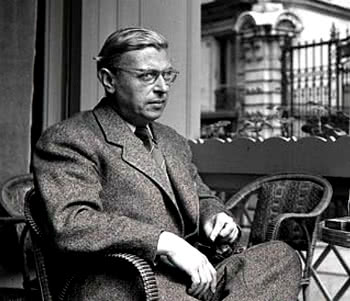Jean-Paul Sartre was a French philosopher and critic. He is considered one of the greatest thinkers of the 20th century and representative of existentialist philosophy, alongside philosophers Albert Camus and Simone de Beauvoir.
The existentialist current is based on the freedom of the human being and according to Sartre: “ We are condemned to be free. “
Biography
Jean-Paul Charles Aymard Sartre was born in Paris, on June 21, 1905. He was the son of Jean-Baptiste Marie Eymard Sartre and Anne-Marie Schweitzer.
He was orphaned by a father very early, when he was just a year old. Therefore, he moved with his mother to the city of Meudon, close to the capital, where they started to live in the home of their maternal grandparents.
From an early age, Sartre read many classics and was interested in the arts, especially cinema, which would later lead him to write plays and novels.
At just 10 years old, he won his first typewriter and entered the Henri VI Lyceum in Paris.
“ (…) because I discovered the world through language, I took language for a long time around the world. To exist was to have a trademark, some door on the infinite tablets of the Word; to write was to record new beings in it was my most tenacious illusion, to harvest living things in the traps of sentences. “
At the age of 19, he entered the Philosophy course at “Escola Normal Superior”, where he met Simone de Beauvoir , his intellectual partner and lifelong lover.
He graduated in 1928, worked as a teacher and, with that, decided to deepen his knowledge in existentialist philosophy in order to create his own theory.
Soon, he won a scholarship and went to study at the French Institute in Berlin. At that time, he dedicated himself to the studies of phenomenology and existentialism of philosophers: Edmund Husserl (1859-1938), Martin Heidegger (1889-1976), Karl Jaspers (1883-1969), Max Scheller (1874-1928) and Soren Kierkegaard ( 1813-1855).
He participated in the second world war, as a meteorologist. He was trapped in the concentration camps in Trier and, due to illness, was released.
Consequently, he founded the group “Socialism and Freedom”. A restless spirit, Sartre was a committed intellectual, joined the French communist party, where he participated in many social movements, such as the student movement of 1968.
In 1945, together with intellectuals, Simone de Beauvoir (1908-1986), Merleau-Ponty (1908-1961) and Raymnond Aron (1905-1983), he founded the philosophy magazine “ Os Tempos Modernos .”
A curious fact of his life is that Sartre refused to receive the Nobel Prize for Literature in 1964:
“ In it I invoked two kinds of reasons; personal reasons and objective reasons. The personal reasons are as follows: my denial is not an improvised act. I have always refused official distinctions. “
He died in his hometown, April 15, 1980, at the age of 75.
Main Ideas and Works
Sartre was an avid reader and writer. He produced philosophical texts, novels, novels, short stories and essays.
His most outstanding work is entitled “ The Being and the Nothing: an essay on phenomenological ontology ”, published in 1943
This philosophical treatise addresses Heidegger’s philosophy and some thoughts on human freedom. However, it was essential to configure his own theory about existentialism.
According to Sartre, the human being exists as a thing and a conscience (mind).
In 1938, he published the novel “ Nausea ”, his first literary success:
“ Men. It is necessary to love men. Men are admirable. I feel like throwing up – and suddenly here it is: Nausea. So this is Nausea: this blinding evidence? I exist – the world exists – and I know the world exists. That is all. But it doesn’t matter to me. It is strange that everything is so indifferent to me: it scares me. I would like so much to abandon myself, to stop being aware of my existence, to sleep. But I can’t, I suffocate: existence penetrates me everywhere, through the eyes, through the nose, through the mouth … And suddenly, suddenly, the veil is torn: I understood, I saw. Nausea has not abandoned me, and I don’t think it will leave me anytime soon; but I am no longer subjected to it, it is no longer a disease, nor a passing access: Nausea is me . ”
Other works that stand out:
- The Wall (1939)
- The Age of Reason (1945)
- With death in the Soul (1949)
- The Flies (1943)
- Dead without grave (1946)
- The gear (1948)
- The Imagination (1936)
- The Transcendence of the Ego (1937)
- Outline of a Theory of Emotions (1939)
- The Imaginary (1940)
- The words (1964)
Phrases
- ” Man must be invented every day .”
- ” I change to stay the same .”
- ” When the rich make war, it is always the poor who die .”
- ” I was born to satisfy the great need I had for myself .”
- “ All men are afraid. Who is not afraid is not normal; this has nothing to do with courage . ”
- ” That’s what living is: Staying in balance all the time, between choices and consequences .”
- “ We don’t do what we want and yet we are responsible for what we are: that is the truth .”
- ” A love, a career, a revolution: so many other things that start without knowing how they will end .”

